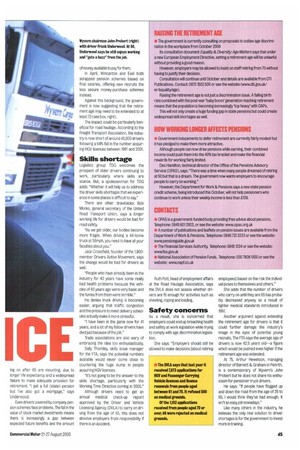SENIOR SERI
Page 44

Page 45

If you've noticed an error in this article please click here to report it so we can fix it.
At 84, Doug Brown still rues the day he retired from truck driving. The former employee of Richard Read (Transport) in Gloucestershire finally quit two years ago because of knee problems—but now that he has new knee Joints, he feels quite capable of driving HG Vs again.
"If I had kept my licence, I would still be working now,' he says. "Driving was so easy with everything palletised, and I was with a nice set of drivers. The money was handy for an GAP as well."
Brown's attitude is by no means exceptional among over 65-year-olds, even though he carried on driving for much longer than most.
Frank Underwood, aged 66, puts in a 60-hour week for Wyvern Cargo in Poole, Dorset, doing a mixture of HGV driving and parcel deliveries in vans. He says: "I don't find it hard and still get a little bit of a buzz from some of the job. I like being out and about and couldn't possibly be in one environment all the time."
He welcomes having to load up parcels and boxes, because it helps to keep him fit.
"All the guys here who just do HGV work are fat. They just sit in the thing; there's no physical work at all." His boss, John Probert, himself aged 75, agrees that age is not necessarily an obstacle to driving HGVs. it's not an arduous job with all the electronic cocooning in the cab."
He points out that Uncterwood's sickness record compares very favourably with those of many younger drivers in the company.
Arguments in favour of more drivers such as Brown and Underwood soldier ing on after 65 are mounting, due to longer life expectancy and a widespread failure to make adequate provision for retirement. "I get a full (state) pension but I've also got a mortgage," says Underwood.
Even drivers covered by company pension schemes face problems. The fall in the value of stock market investments means there is increasingly a gap between expected future benefits and the amount of money available to pay for them.
In April, Wincanton and Exel both scrapped pension schemes based on trial salaries, offering new recruits the less secure money-purchase schemes instead.
Against this background, the government is now suggesting that the retirement age may need to be extended to at least 70 (see box, right).
The impact could be particularly beneficial for road haulage. According to the Freight Transport Association, the industry is now short of around 40000 drivers following a 64% fall in the number acquiring HGV licences between 1991 and 2001.
Skills shortage
Logistics group TOG welcomes the prospect of older dryers continuing to work, particularly where skills are scarce. But, a spokeswoman for TDG adds: "Whether it will help us to address the driver skills shortages that we experience in some places is difficult to say."
There are other drawbacks; Bob Monks, general secretary of the United Road Transport Union, says a longer working life for drivers would be bad for road safety.
"As we get older, our bodies become more fragile. When driving a 44-tonne truck at 56mph, you need to have all your faculties about you."
Jack Crossf eld, founder of the 1,800member Drivers Action Movement, says the change would be bad for drivers as well.
"People who have already been in the industry for 40 years have some really bad health problems because the vehicles of 40 years ago were very basic and the fumes from them were terrible."
He denies truck driving is becoming easier, arguing that traffic congestion and the pressure to meet delivery schedules actually make it more stressful.
"I have been in the game now for 41 years, and a lot of my fellow drivers have died just because of the job."
Trade associations are also wary of embracing the idea too enthusiasticaliy.
Sally Thornley, skills issue manager for the FfA, says the potential numbers available would never come close to countering the huge slump in people acquiring HGV licences.
"It's not going to be the answer to the skills shortage, particularly with the Working Time Directive coming in 2005."
Although drivers need to get an annual medical check-up report approved by the Driver and Vehicle Licensing Agency (DVLA) to carry on driving from the age of 65, this does not absolve employers from responsibility if there is an accident. Ruth Pott, head of employment affairs at the Road Haulage Association, says the DVLA does not assess whether drivers are fit enough for activities such as sheeting, roping and loading.
Safety concerns
As a result, she is concerned that employers could end up breaching health and safety at work legislation while trying to comply with age discrimination legislation.
She says: "Employers should still be allowed to make decisions [about retiring employees] based on the risk the individual poses to themselves and others."
She adds that the number of drivers who carry on until they are 65 has probably decreased anyway as a result of tighter medical standards introduced in 1997.
Another argument against extending the retirement age for drivers is that it could further damage the industry's image in the ayes of potential young recruits. The FTA says the average age of drivers is now 42.5 years old—a figure which would be pushed even higher if the retirement age was extended.
At 75, Arthur Hewetson, managing director of Barnett & Graham in Penrith, is a contemporary of Wyvern's John Probert but he does not share his enthusiasm for pensioner truck drivers.
He says: "if people have flogged up and down the road from the age of 25 to 65, I would think they've had enough. It isn't an easyjob nowadays."
Like many others in the industry, he believes the only real solution to driver shortages is for the government to invest more in training.
































































































































































